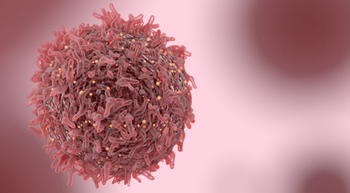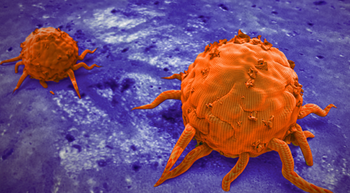
Dexamethasone sparing in cisplatin-based chemotherapy did not impair global health status, although it did worsen nausea and appetite loss.

Dexamethasone sparing in cisplatin-based chemotherapy did not impair global health status, although it did worsen nausea and appetite loss.

Gretchen McNally PhD, ANP-BC, AOCNP, discusses the potential impact advanced practice providers and nurses could have in the opioid pandemic if the correct educational opportunities were available.

The expansion of screening criteria is an important step in decreasing lung cancer screening disparities in high-risk populations. Efforts to expand community outreach, overcome logistical barriers, and facilitate screening adherence must still be made, experts say.

Laura J. Zitella, MS, RN, ACNP-BC, AOCN, presents a case study of a patient receiving chemotherapy for osteosarcoma who begins experiencing shortness of breath.

Nurse navigators may play a key role in mitigating toxicities from chemotherapy and perform geriatric assessments for patients treated at hematology/oncology clinics.

Ilene Galinsky, BSN, MSN, ANP-C, discusses the evolution of targeted therapy in acute myeloid leukemia treatment, and how venetoclax plays into the treatment paradigm.

The NCCN guidelines have been amended to include trastuzumab deruxtecan for use in patients with HER2-low metastatic breast cancer and sacituzumab govitecan for use in patients with triple-negative breast cancer or hormone receptor–positive, HER2-negative disease.

Investigators have identified that zanubrutinib may improve the subpar health-related quality of life for patients with treatment-naïve chronic lymphocytic leukemia or small lymphocytic lymphoma.

The addition of the HER2-Vaxx vaccine to chemotherapy resulted in 41.5% reduction in the risk of death compared with chemotherapy alone among patients with gastric cancers.

Darcy Burbage, DNP, RN, AOCN, CBCN, discusses the top takeaways from the 2022 ASCO Annual Meeting for oncology nurses.

An updated safety and efficacy analysis of the ongoing CLL14 trial showed that venetoclax plus obinutuzumab continues to be an effective treatment for patients with chronic lymphocytic leukemia and coexisting conditions.

Each month, we take a look back at the most popular Oncology Nursing News® stories. Here are the top 5 stories from June 2022.

Data from the CheckMate 648 trial informed the FDA’s recent approval of 2 nivolumab combinations for esophageal squamous cell carcinoma. A 1-year follow-up analysis highlighted key safety and time-to-event data surrounding immune-related toxicities.

Mandible reconstruction and maxilla reconstruction surgeries might be optimized with virtual surgical planning, according to an expert speaker at the 2022 Supportive Care in Cancer Annual Meeting.

We rounded up 5 stories from the 2022 ASCO Annual Meeting that are of most value to oncology nurses.

Mary Lynn McPherson, PharmD, BCPS, FAAHPM, and Amy A. Case, MD, FAAHPM, argue that buprenorphine should play a larger role in cancer-related pain management because of its unique pharmacology and consequent safety profile.

Results of a single-center study presented at the 2022 ASCO Annual Meeting showed that oral minoxidil may be effective in treating late alopecia. Moving forward, these efforts in survivorship care will need to be expanded to less resourced areas, experts said.

At the 2022 Supportive Care in Cancer Annual Meeting, Jeffrey Crawford, MD, highlighted the potential value of biosimilars in reducing gaps in care for the treatment of febrile neutropenia.

Data from the phase 1/2 EPCORE NHL-2 trial suggest that the combination of epcoritamab and R-CHOP is both effective and manageable in treating patients with high-risk diffuse large B-cell lymphoma.

Utilization of specialty nurse practitioner driven teams and use of individualized pain protocols for patients admitted with vaso-occlusive pain crisis improves quality of life for patients with sickle cell disease, and decreased hospital stay times.

The FDA has approved lisocabtagene maraleucel as a second-line treatment for patients with relapsed or refractory large B-cell lymphoma.

Updated data from the phase 3 BELIEVE trial revealed a sustained reduction in the need for red blood cell transfusions among patients with β-thalassemia who received treatment with luspatercept-aamt.

This year’s congress showcased strategies for communicating sensitive topics, patient experiences with immunotherapy treatments, updates in the utility of medical cannabis, and more.

Laura J. Zitella, MS, RN, ACNP-BC, AOCN, recounts key nursing considerations with targeted therapy for chronic lymphocytic leukemia, and third-line diffuse large b-cell lymphoma options.

The FDA approval of dabrafenib plus trametinib for BRAF V600E–mutated unresectable or metastatic solid tumors highlights a potential need for routine BRAF testing in clinical practice, experts say.

Heavily pretreated pediatric and young adult patients with relapsed or refractory B-cell acute lymphoblastic leukemia maintained response with tisagenlecelucel according to long-term follow-up data from the phase 2 ELIANA trial.

Approximately 140 in 100,000 pregnant women receive a cancer diagnosis. Of these diagnoses, 0.1% are considered malignant tumors.

The intracranial objective response rate was 32% among patients with KRAS G12C–mutant, non–small cell lung cancer who received adagrasib.

Phase 2 findings found that patients with chemotherapy-induced anemia experienced increases in hemoglobin following treatment with roxadustat.

A Michigan State University investigator is preparing to expand on an encouraging pilot study that used a music-listening intervention to influence chemotherapy-induced nausea.